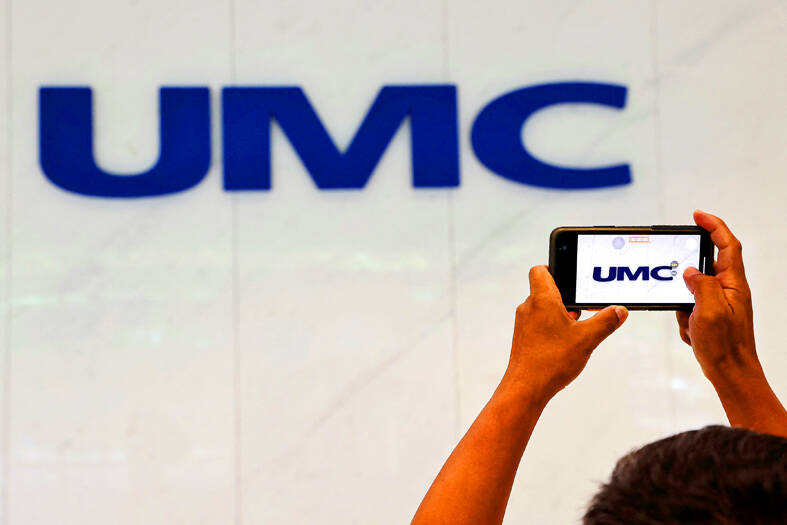United Microelectronics Corp (UMC, 聯電), the world’s No.4 foundry service provider, saw its stock price rally about 7 percent yesterday, boosted by stronger-than-expected quarterly earnings last quarter and robust business outlook.
The stock price of UMC yesterday jumped 6.94 percent to close at NT$53.9, hitting the highest level in about two weeks. The stock out-performed the TAIEX, which gained 1.99 percent yesterday. UMC was the top choice of foreign investors, who registered a net buying of 93.24 million shares yesterday.
UMC’s net profits surged 31.8 percent sequentially to NT$13.79 billion last quarter, compared with NT$10.46 billion in the first quarter, the chipmaker told a virtual investor conference on Wednesday. Earnings per share rose to NT$1.11 from NT$0.84, it said.

Photo: Ann Wang, Reuters
Gross margin improved to 35.2 percent last quarter, beating its earlier estimate of 30 percent and up from 30.9 percent in the first quarter, thanks to foreign exchange gains, it said.
For this quarter, the chipmaker expects “to see a mild pickup in communications, consumer and computing segments,” UMC copresident Jason Wang (王石) said.
The chipmaker’s 22-nanometer and 28-nanometer business remains a “promising growth driver” with a number of new chips being launched in the second half of this year for applications including display drivers, connectivity and networking, Wang said.
“However, we have not seen signs of a strong rebound yet as customers remain prudent in managing their inventories,” he said.
The automotive segment remained soft this quarter and might remain so in the next quarter, due to inventory corrections, he said, adding that the segment is expected to return to normalcy from the first quarter of next year when industry inventory becomes healthier.
Wafer shipments are expected to grow by 5 percent this quarter, accelerating from a 2.6 percent increase last quarter, Wang said.
Average selling prices would remain firm, he added.
Gross margin is likely to hover at about 35 percent, dampened by higher utilities and equipment depreciation costs, the chipmaker said.
Factory utilization rate is to rise to about 70 percent this quarter from 68 percent in the prior quarter, Wang said.
UMC has doubled its silicon interposer capacity to 6,000 units this year to cope with customer demand, Wang said.
Silicon interposers are used in advanced packaging technology for artificial intelligence (AI) chips.
UMC is considered one of the potential suppliers of advanced packaging solutions as AI chip designers are seeking to ease tight supply from Taiwan Semiconductor Manufacturing Co’s (台積電) chip-on-wafer-on-substrate solution.
UMC said it is on track to ramp up chip production at an advanced fab in Singapore, which is scheduled to enter production in January 2026, before reaching high-volume production in the second half of 2026.

Real estate agent and property developer JSL Construction & Development Co (愛山林) led the average compensation rankings among companies listed on the Taiwan Stock Exchange (TWSE) last year, while contract chipmaker Taiwan Semiconductor Manufacturing Co (TSMC, 台積電) finished 14th. JSL Construction paid its employees total average compensation of NT$4.78 million (US$159,701), down 13.5 percent from a year earlier, but still ahead of the most profitable listed tech giants, including TSMC, TWSE data showed. Last year, the average compensation (which includes salary, overtime, bonuses and allowances) paid by TSMC rose 21.6 percent to reach about NT$3.33 million, lifting its ranking by 10 notches

Popular vape brands such as Geek Bar might get more expensive in the US — if you can find them at all. Shipments of vapes from China to the US ground to a near halt last month from a year ago, official data showed, hit by US President Donald Trump’s tariffs and a crackdown on unauthorized e-cigarettes in the world’s biggest market for smoking alternatives. That includes Geek Bar, a brand of flavored vapes that is not authorized to sell in the US, but which had been widely available due to porous import controls. One retailer, who asked not to be named, because

SEASONAL WEAKNESS: The combined revenue of the top 10 foundries fell 5.4%, but rush orders and China’s subsidies partially offset slowing demand Taiwan Semiconductor Manufacturing Co (TSMC, 台積電) further solidified its dominance in the global wafer foundry business in the first quarter of this year, remaining far ahead of its closest rival, Samsung Electronics Co, TrendForce Corp (集邦科技) said yesterday. TSMC posted US$25.52 billion in sales in the January-to-March period, down 5 percent from the previous quarter, but its market share rose from 67.1 percent the previous quarter to 67.6 percent, TrendForce said in a report. While smartphone-related wafer shipments declined in the first quarter due to seasonal factors, solid demand for artificial intelligence (AI) and high-performance computing (HPC) devices and urgent TV-related orders

MINERAL DIPLOMACY: The Chinese commerce ministry said it approved applications for the export of rare earths in a move that could help ease US-China trade tensions Chinese Vice Premier He Lifeng (何立峰) is today to meet a US delegation for talks in the UK, Beijing announced on Saturday amid a fragile truce in the trade dispute between the two powers. He is to visit the UK from yesterday to Friday at the invitation of the British government, the Chinese Ministry of Foreign Affairs said in a statement. He and US representatives are to cochair the first meeting of the US-China economic and trade consultation mechanism, it said. US President Donald Trump on Friday announced that a new round of trade talks with China would start in London beginning today,